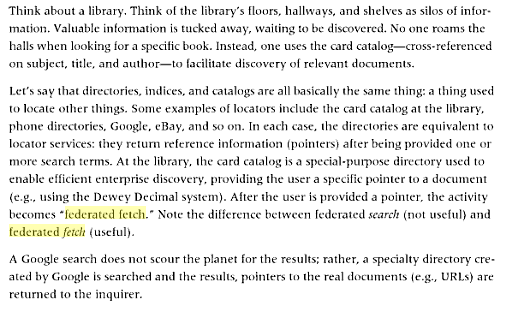Aug
“Federated fetching” is a new term to me. I discovered it at Srinivas Reddy’s Weblog, referencing the O’Reilly book, Beautiful Data:
When we deal with web scale data ‘discoverability’ of information is key. While ‘web search’ provides a lot of value today what we really need is to enable ‘data find data’. I like the differentiation in the book between ‘federated search’ and ‘federated fetch’. The latter needs adaptive systems that can discover new data correlations based on user context and new data collected.
This reference got me curious. Was the Web buzzing with discussion of federated search vs. federated fetch? Not exactly, according to Google, although there are 740 references to the phrase but only 24 of them are considered unique enough for Google to display. Interestingly enough, the first reference is to Jeff Jonas “When Federated Search Bites” article which I wrote about a month ago.
Once a directory reveals a pointer, you can go fetch it. Federated fetch does scale.
Google Books provides the term in the context of the Beautiful Data book:

So, federated fetch is the “end game,” if I understand the concept correctly. It’s what you get when, for example, a link resolver gets you to the full text copy of a book you can actually read.
There you have it, a new phrase I learned today.
Tags: federated search


One Response to "On federated fetching"
August 21st, 2010 at 6:25 pm
I think that there’s more to the term “federated fetch” than Sol’s analogy of “federated fetch” to a link resolver that gets you to the full-text of an article.
Srinivas just hints at more in his review of Beautiful Data where he talks of “federated fetch” systems “needing adaptive systems that can discover data correlations”.
I can envision future “federated fetch” systems interacting at a deeper level, with an information source, requiring going back and forth between a user and multiple information sources in order to narrow down the information returned so that a user’s information needs are satisfied.